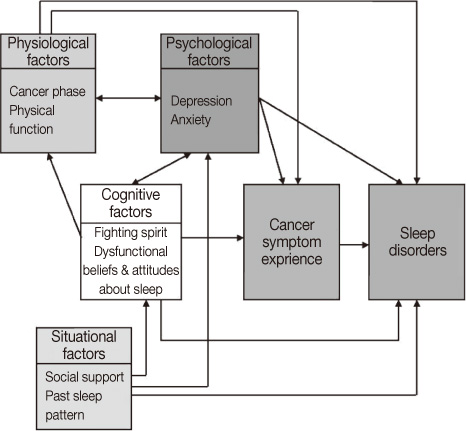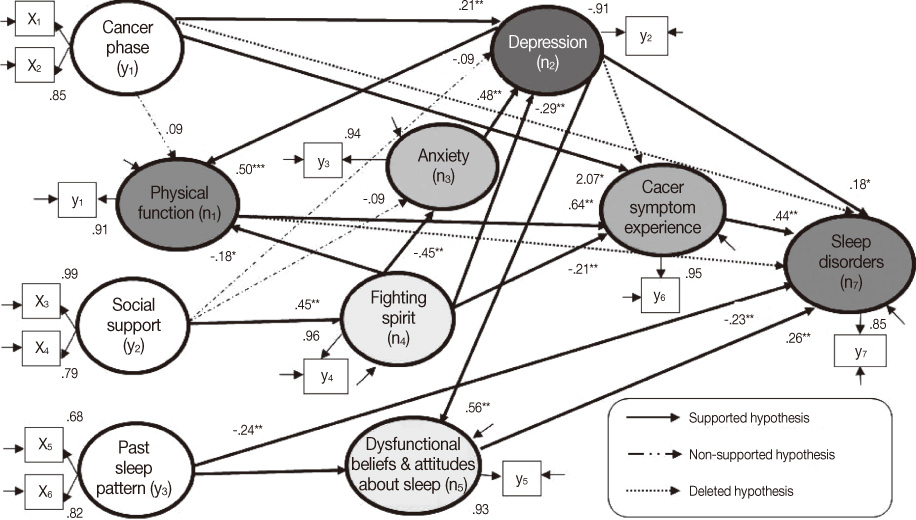J Korean Acad Nurs.
2011 Aug;41(4):460-470. 10.4040/jkan.2011.41.4.460.
An Explanatory Model for Sleep Disorders in People with Cancer
- Affiliations
-
- 1Department of Nursing, Jeonbuk Science College, Jeongeup, Korea. joha0219@hanmail.net
- 2College of Nursing, Yonsei University, Seoul, Korea.
- KMID: 1018331
- DOI: http://doi.org/10.4040/jkan.2011.41.4.460
Abstract
- PURPOSE
The aim of this study was to develop and test an explanatory model for sleep disorders in people with cancer. A hypothetical model was constructed on the basis of a review of previous studies, literature, and sleep models, and 10 latent variables were used to construct a hypothetical model.
METHODS
Data were collected from April 19 to June 25, 2010, using self-report questionnaires. The sample was 291 outpatients with cancer who visited the oncology cancer center at a university hospital. Collected data were analyzed using SPSS Win 15.0 program for descriptive statistics and correlation analysis and AMOS 7.0 program for covariance structural analysis.
RESULTS
It appeared that overall fit index was good as chi2/df=1.162, GFI=.969, AGFI=.944, SRMR=.052, NFI=.881, NNFI=.969, CFI=.980, RMSEA=.024, CN=337 in the modified model. The explanatory power of this model for sleep disorders in people with cancer was 62%. Further, sleep disorders were influenced directly by cancer symptom experience, dysfunctional beliefs and attitudes about sleep, and past sleep pattern.
CONCLUSION
Findings suggest that nurses should assess past sleep pattern and consider the development of a comprehensive nursing intervention program to minimize the cancer symptom experience, dysfunctional beliefs and attitudes about sleep, and thus, reduce sleep disorders in people with cancer.
Keyword
MeSH Terms
Figure
Cited by 2 articles
-
Related Factors to Quality of Life among Hospitalized Cancer Patients Undergoing Chemotherapy
Ji Yeon Jeong, Hyang Sook So, Ji Eun Hong, Myeong Jeong Chae, Geunhye Han
Asian Oncol Nurs. 2012;12(1):84-91. doi: 10.5388/aon.2012.12.1.84.Sleep Pattern and Factors Causing Sleep Disturbance in Adolescents with Cancer before and after Hospital Admission
Jin Jung, Eun-Hye Lee, You-Jin Yang, Bo-Yoon Jang
Asian Oncol Nurs. 2017;17(3):143-150. doi: 10.5388/aon.2017.17.3.143.
Reference
-
1. Arving C, Sjödén PO, Bergh J, Hellbom M, Johansson B, Glimelius B, et al. Individual psychosocial support for breast cancer patients: A randomized study of nurse versus psychologist interventions and standard care. Cancer Nursing. 2007. 30:E10–E19. doi:10.1097/01.NCC.0000270709.64790.05.2. Ashworth PC, Davidson KM, Espie CA. Cognitive-behavioral factors associated with sleep quality in chronic pain patients. Behavioral Sleep Medicine. 2010. 8:28–39. doi:10.1080/15402000903425587.3. Bae BR. Comprehension and practice of structural equation modeling. 2002. Seoul: Daegyeong.4. Borbély AA, Achermann P. Sleep homeostasis and models of sleep regulation. Journal of Biological Rhythms. 1999. 14:557–568.5. Buysse D, Reynolds C 3rd, Monk T, Berman S, Kupfer D. The Pittsburgh Sleep Quality Index: A new instrument for psychiatric practice and research. Psychiatry Research. 1989. 28:193–198. doi:10.1016/0165-1781(89)90047-4.6. Cicero V, Coco GL, Gullo S, Verso GL. The role of attachment dimensions and perceived social support in predicting adjustment to cancer. Psycho-oncology. 2009. 18:1045–1052. doi:10.1002/pon.1390.7. Cleeland CS, Mendoza TR, Wang XS, Chou C, Harle MT, Morrissey M, et al. Assessing symptom distress in cancer patients-The M.D. Anderson Symptom Inventory. Cancer. 2000. 89:1634–1646. doi:10.1002/1097-0142(20001001)89:7.8. Cordova M, Giese-Davis J, Golant M, Kronnenwetter C, Chang V, McFarlin S, et al. Mood disturbance in community cancer support groups: The role of emotional suppression and fighting spirit. Journal of Psychosomatic Research. 2003. 55:461–467. doi:10.1016/S0022-3999(03)00510-5.9. Davidson JR, MacLean AW, Brundage MD, Schulze K. Sleep disturbance in cancer patients. Social Science and Medicine. 2002. 54:1309–1321. doi:10.1016/S0277-9536(01)00043-0.10. Du-Quiton J, Wood PA, Burch JB, Grutsch JF, Gupta D, Tyer K, et al. Actigraphic assessment of daily sleep-activity pattern abnormalities reflects self-assessed depression and anxiety in outpatients with advanced non-small cell lung cancer. Psycho-oncology. 2010. 19:180–189. doi:10.1002/pon.1539.11. Epstein DR, Dirksen SR. Randomized trial of a cognitive-behavioral intervention for insomnia in breast cancer survivors. Oncology Nursing Forum. 2007. 34:E51–E59. doi:10.1188/07.ONF.E51-E59.12. Espie CA. Insomnia: Conceptual issues in the development, persistence, and treatment of sleep disorder in adults. Annual Review of Psychology. 2002. 53:215–243. doi:10.1146/annurev.psych.53.100901.135243.13. Fayer P, Aaronson NK, Bjordal K, Sullian M. EORTC QLQ C-30 Scoring Manual. 1995. Brussels: Belgium.14. Harvey AG. A cognitive model of insomnia. Behaviour Research and Therapy. 2002. 40:869–893. doi:10.1016/S0005-7967(01)00061-4.15. Koopman C, Nouriani B, Erickson V, Anupindi R, Butler LD, Bachmann MH, et al. Sleep disturbances in women with metastatic breast cancer. The Breast Journal. 2002. 8:362–370. doi:10.1046/j.1524-4741.2002.08606.x.16. Le Guen Y, Gagnadoux F, Hureaux J, Jeanfaivre T, Meslier N, Racineux JL, et al. Sleep disturbances and impaired daytime functioning in outpatients with newly diagnosed lung cancer. Lung Cancer. 2007. 58:139–143. doi:10.1016/j.lungcan.2007.05.021.17. Lee K, Cho M, Miaskowski C, Dodd M. Impaired sleep and rhythms in persons with cancer. Sleep Medicine Reviews. 2004. 8:199–212. doi:10.1016/j.smrv.2003.10.001.18. Lenz ER, Pugh LC, Milligan RA, Gift AC, Suppe F. The middle range theory of unpleasant symptoms: An update. Advances in Nursing Science. 1997. 19:14–27.19. Liu L, Fiorentino L, Natarajan L, Parker BA, Mills PJ, Sadler GR, et al. Pre-treatment symptom cluster in breast cancer patients is associated with worse sleep, fatigue and depression during chemotherapy. Psycho-oncology. 2009. 18:187–194. doi:10.1002/pon.1412.20. Morin CM, Vallières A, Ivers H. Dysfunctional beliefs and attitudes about sleep (DBAS): Validation of a brief version (DBAS-16). Sleep. 2007. 30:1547–1554.21. Mystakidou K, Parpa E, Tsilika E, Pathiaki M, Patiraki E, Galanos A, et al. Sleep quality in advanced cancer patients. Journal of Psychosomatic Research. 2007. 62:527–533. doi:10.1016/j.jpsychores.2006.11.008.22. Redeker NS, Lev EL, Ruggiero J. Insomnia, fatigue, anxiety, depression, and quality of life of cancer patients undergoing chemotherapy. Scholarly Inquiry for Nursing Practice. 2000. 14:275–290.23. Savard J, Villa J, Ivers H, Simard S, Morin CM. Prevalence, natural course, and risk factors of insomnia comorbid with cancer over a 2-month period. Journal of Clinical Oncology. 2009. 27:5233–5239. doi:10.1200/JCO.2008.21.6333.24. Sherbourne CD, Stewart AL. The MOS social support survey. Social Science and Medicine. 1991. 32:705–714. doi:10.1016/0277-9536(91)90150-B.25. Spielman AJ, Caruso LS, Glovinsky PB. A behavioral perspective on insomnia treatment. The Psychiatric Clinics of North America. 1987. 10:541–553.26. Stepanski EJ, Walker MS, Schwartzberg LS, Blakely LJ, Ong JC, Houts AC. The relation of trouble sleeping, depressed mood, pain, and fatigue in patients with cancer. Journal of Clinical Sleep Medicine. 2009. 5:132–136.27. Vena C, Parker K, Cunningham M, Clark J, McMillan S. Sleep-wake disturbances in people with cancer part I: An overview of sleep, sleep regulation, and effects of disease and treatment. Oncology Nursing Forum. 2004. 31:735–746. doi:10.1188/04.ONF.735-746.28. Watson M, Greer S, Young J, Inayat Q, Burgess C, Robertson B. Development of questionnaire measure of adjustment to cancer: The MAC scale. Psychological Medicine. 1988. 18:203–209.29. Woodley J, Smith S. Safety behaviors and dysfunctional beliefs about sleep: Testing a cognitive model of the maintenance of insomnia. Journal of Psychosomatic Research. 2006. 60:551–557. doi:10.1016/j.jpsychores.2006.03.002.30. Zigmond AS, Snaith RP. The hospital anxiety and depression scale. Acta Psychiatrica Scandinavica. 1983. 67:361–370.



